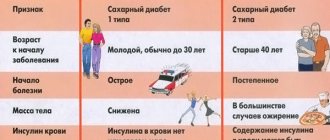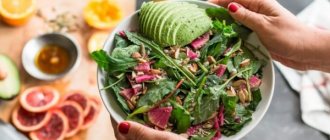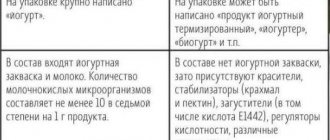Mediterranean diet menu for the week, recipes - everyone is looking for not only for weight loss. This diet helps with atherosclerosis, heart and vascular diseases, and relieves stress on the kidneys and digestion. She is the secret of energy and healthy slimness of many stars. The rules of the Mediterranean diet for a week and recipes adapted to Russia are in this article.
Hi all! Svetlana Morozova is with you. Today I will tell you about probably the healthiest diet for weight loss - the Mediterranean. You will find out what its essence and benefits are, what the menu can be, what foods you can and should eat, and which are limited, and how you can generally use it in Russian conditions. Go!
Friends, read the article further, there will be a lot of interesting things in it! And for those who want: “Find out the degree of slagging in your body” or “Find out what’s stopping you from losing weight?” Take Selection TEST
Diet Facts and Myths
Nutrition trends have changed a lot lately, which can make it difficult to know what's healthy and what's not. Therefore, it is important to be able to separate facts from myths.
Myth 1: The lower your fat intake, the better.
A few years ago, a low-fat diet was considered the best option for reducing the risk of heart disease. But today, most nutritionists recommend the Mediterranean diet as the most suitable for maintaining heart health, despite its fat content. Some fats are healthy and important for the body.
Myth 2: Diet food is tasteless
Many people mistakenly believe that food suitable for the proper functioning of the body does not contain salt, fat, spices, and therefore is absolutely tasteless. But the Mediterranean diet menu is rich in healthy vegetable fats, which are carriers of taste.
For example, a slice of avocado on whole grain bread, a handful of nuts in a steamed vegetable, or a few drops of olive oil in a tomato salad are sure to satisfy your taste buds while providing improved health.
Myth 3: Saturated fats are not bad for you.
Recently, the connection between saturated fat intake and health has been discussed in medical circles. Previously they were considered less harmful. But, according to scientists, this analysis is not accurate. On the contrary, there is evidence linking increased consumption of saturated fat to an increased risk of a number of diseases. It is beneficial to replace saturated fats with monounsaturated fatty acids (olive oil, seeds, fish oil, nuts) found in Mediterranean diet foods.
Pros and cons of the Mediterranean diet
| pros | Minuses |
|
|
How and why does it work?
The list of products for Mediterranean diet dishes is based on olives, seafood, and fish. Consequently, high-quality fats take precedence in the diet. The products contain a lot of unsaturated fats, which have a beneficial effect on cholesterol levels. This is the reason why residents of Southern European countries suffer much less often from heart attacks and strokes.
A healthy Mediterranean diet also includes lots of vegetables, legumes, lean meat, and poultry. Usually a large portion of vegetable salad is served as a side dish (not small plates, like ours).
Dishes are prepared from fresh local products with a minimum of semi-finished products. Herbs and spices help speed up metabolism and improve digestion, which is why the Mediterranean diet is also effective for weight loss. Sweets are replaced with fruits, nuts (not salted), and seeds. Pork and beef are rarely consumed.
Selection and replacement of products in Russian conditions
The diet involves the use of fairly expensive products: red fish, nuts, wine. All this in Russian conditions can be too expensive, and it can be difficult to find such products.
Because of this, a special “Mediterranean diet” was developed for Russia. She suggests that those losing weight replace these products with more accessible, cheaper, and familiar ones. This will help patients not only financially. The body will not have to adapt to new food, it will not be so stressed.
Still, the main thing is to comply. ratio principle: 60% of the daily diet - fruits and vegetables, 20-25 - healthy saturated fats, the remainder - protein products.
Olive oil
Olive oil is a completely traditional, common product for Mediterranean residents. It is added to dishes, salads, and snacks. It is believed that the oil helps preserve the cardiovascular system, reduces the level of bad cholesterol, and prevents the development of plaques on the walls of blood vessels.
In Russia, olive oil has a fairly high cost, and, moreover, it is not widespread enough: it will be very difficult for residents of remote rural areas to find it.
Russians are offered another, more profitable alternative - unrefined vegetable oil. In addition, it contains more polyunsaturated fatty acids than olive oil: sunflower oil has 72%, while olive oil has only 10%.
red fish
Red fish is a storehouse of nutrients, containing a high concentration of polyunsaturated fatty acids omega-3 and omega-6. Residents of sea coasts often eat it as there are no problems with production and supply. It is also found on Russian shelves, but at extremely high prices. In addition, harmful preservatives are often used during transportation.
Russians can get their daily dose of omega fatty acids relatively easily and cheaply by consuming two tablespoons of flaxseeds or flaxseed oil. And in terms of the amount of protein, red fish is not inferior to herring and mackerel, of which there are quite a lot on Russian shelves.
Slow carbohydrates
The Mediterranean diet suggests using bulgur, couscous, brown rice and special Italian pasta as slow carbohydrates. But in fact, any cereal will do, as well as pasta made from durum wheat. It is allowed to consume all legumes (soybeans, lentils, beans), as well as potatoes seasoned with herbs. On the Internet you can find recipes adapted to Russian conditions, using familiar products that are accessible to everyone. The main thing is to monitor the volume of portions, the overall ratio of proteins, fats and carbohydrates in the diet.
Milk
Residents of southern countries are very fond of cheese and eat special varieties, usually curds, with the addition of herbs and spices. They can be replaced with regular hard Russian ones, the only thing is to reduce the portion, because:
- curd cheese has the following indicators per 100 grams: kilocalories - 225, protein - 17.4 g, fat - 16.9 g, carbohydrates - 0.61 g;
- hard cheese: kilocalories – 363, protein – 24.1 g, fat – 29.5 g, carbohydrates – 0.3 g.
You may notice that the domestic product is higher in calories and has higher fat content. In addition, salt is often added to it in fairly large quantities. Therefore, the daily portion should be reduced to 30 grams, and preference should be given to unsalted varieties.
All other dairy products can be consumed without restrictions, unless there is an individual intolerance or allergy.
How to diet: healthy and unhealthy foods
The Mediterranean diet menu (for weight loss and health maintenance) includes the following list of products:
- vegetables;
- fruits;
- olive oil;
- lean meat;
- whole grain;
- fish, seafood;
- dairy products;
- herbs, spices;
- legumes;
- nuts;
- seeds;
- red wine.
Suitable foods included in Mediterranean diet recipes include olives, almonds, artichokes, asparagus, and tomatoes.
Experts graphically depicted the results of the study in the so-called pyramid of the Mediterranean diet, a selection of photo options in different languages is presented below, available sizes for printing:
Foods that burden the body should be excluded from the diet. These products include:
- sweets;
- sausages;
- fat meat;
- fried foods;
- sweet drinks;
- alcohol (with the exception of natural wine);
- fatty dairy products;
- salt.
Table of calories of foods (kcal/100 g) that contain foods included in the Mediterranean diet menu:
| Fish, seafood | Fruits | Legumes | Vegetables | ||||
| View | kcal | View | kcal | View | kcal | View | kcal |
| Mackerel | 115 | A pineapple | 51 | Beans | 330 | Potato | 80 |
| Salmon | 116 | Banana | 59 | Peas | 335 | Broccoli | 32 |
| Sardine | 130 | Peach | 41 | Lentils | 325 | Celery | 26 |
| Carp | 95 | Lemon | 23 | Soybeans | 445 | Onion | 40 |
| Squid | 92 | Orange | 32 | Garlic | 110 | ||
| Crab, lobster | 86 | Mandarin | 47 | Zucchini | 18 | ||
| lobster | 72 | Grapefruit | 41 | Bean pods | 29 | ||
| Shrimps | 160 | Cherries | 54 | Carrot | 25 | ||
| Oysters | 81 | Cherry | 59 | Cauliflower | 33 | ||
| Pangasius | 70 | Grape | 61 | Cucumber | 20 | ||
| Herring | 121 | Plum | 59 | Paprika | 13 | ||
| Tuna | 144 | Kiwi | 230 | Leek | 20 | ||
| Shark steak | 130 | Watermelon | 67 | Tomato | 30 | ||
| Anchovy | 131 | Apple | 50 | Salad | 14 | ||
| Octopus | 82 | Strawberry | 36 | Radish | 22 | ||
| Sea bass | 94 | Pear | 51 | Red cabbage | 18 | ||
Drinking regime
Along with proper nutrition, you need to remember about the drinking regime. The ideal option is pure water without carbon, sweetened carbonated drinks are taboo. You can have a glass of wine with lunch. This will promote digestion, blood circulation, and the production of antioxidants. And, as a bonus, it will improve your mood.
Lifestyle
In addition to a healthy diet, physical activity is also important. It is recommended to combine the diet with several hours a day in the fresh air.
Recommendations
For the principles of the Mediterranean diet to work, you need to know the basic rules for following it.
About products and meals
- Cereals are eaten for breakfast.
- Vegetables, pasta, noodles, rice, a glass of wine - for lunch.
- Proteins and vegetables for dinner.
- Fruits for dessert (3 servings per day).
- Minimize consumption of figs, grapes, bananas and fruit juices.
- For dairy products, give preference to milk and yogurt (low-fat).
- Cheese is introduced into the diet in moderation.
- Fish is grilled, boiled or stewed twice a week.
- Meat should be lean and without preservatives.
- Honey and sweets are allowed once a week.
Many people ask whether rolls can be included in the Mediterranean diet: yes, this is not forbidden. However, you can eat them no more than 2 times a week.
About the weight loss method
- Lead an active lifestyle and exercise, as the diet involves consuming enough carbohydrates.
- Establish a clear daily routine: meals should be at the same time.
- Drink more water.
- Look for recipes adapted to Russia.
- Always remember that this is a fairly unusual diet. There are no specific dates that promise the loss of so many kilograms. This is a nutrition system that produces results over time.
Since the Mediterranean diet has long been adapted to Russian conditions, there is usually no problem finding the right recipes so as not to go crazy and enjoy a varied menu.
Turkish cuisine. Minimal use of spices. They love to cook vegetables and meat on the grill. Here you can find many eggplant dishes and unique recipes for sweets and baked goods.
Benefit for children, elderly, pregnant women
Mediterranean cuisine is rich not only in antioxidants that protect cells from damage, but also in unsaturated fatty acids. Their consumption already in infancy affects health in older age. Most of them are found in sea fish, vegetable oils, seeds, and nuts. But seeds and nuts are not recommended for very young children due to allergy or inhalation risks.
The quality and composition of the diet significantly affects the growth and development of the child. Therefore, it is advisable to use the principles of the Mediterranean diet from a very early age. Include vegetables, fruits, fish, meat, and oils in your complementary foods.
Previously, it was recommended to give children fish from 1 year old, but today everything is different. Long-term studies have shown that late introduction of a product into the diet can lead to refusal of it. In addition, the diversity of the Mediterranean diet allows the child to become aware of the many tastes, aromas, colors, i.e. all the variety you need for a healthy life.
The Mediterranean diet is not contraindicated during pregnancy if the woman is already following it. But planning a change in diet during this period is not recommended if taste preferences do not predispose to this.
The Mediterranean diet, due to its content of healthy fats and vegetables, is also recommended for older people. An advantage for this age group is also the presence of fiber, important substances, and low calorie content of dishes.
The Mediterranean diet has virtually no contraindications and is recommended for all age groups. An exception is patients with chronic pathology that requires special dietary measures.
Benefits of diet
One of the advantages of the Mediterranean diet is that it not only allows you to lose weight, but also improves the general condition of the body. The benefits of following a diet are as follows:
- Slow but constant weight loss. It is painless and safe for the body: the diet not only burns fat deposits, but also normalizes digestion, helps to form healthy eating habits, so there is no risk of regaining those extra pounds if you fail.
- Improving general condition through a balanced diet. The menu is rich in slowly digestible carbohydrates, proteins, unsaturated fats, fiber, vitamins and minerals: the diet provides a person with all the necessary substances, so it can be maintained for a long time, until the desired weight is achieved.
- Benefit for health. Following the rules of the Mediterranean diet reduces the risk of diabetes, Alzheimer's disease, cardiovascular disease, depression, cancer and other pathologies.
- Improved appearance. The menu is rich in Omega-3, 6 and 9 fatty acids, vitamins A and E, which have a positive effect on the condition of hair, nails and skin.
The diet has minimal contraindications. It is suitable for all people, except those who suffer from gastrointestinal diseases and need a special menu. The diet can be followed during pregnancy and lactation. It does not harm a weakened or sick body.
In this article I will give a lot of practical advice on losing weight, but here is the simplest one - join the “Be Fit” marathon from our expert Nastya Ipatova. Click on the link, it will open in a new window, Nastya described what awaits you at the marathon. The start of the marathon is free and you will also keep the habit tracker from the marathon in any case. I completed one of the marathons with Nastya, I recommend it.
View this post on Instagram
New stream of the marathon “BE IN SHAPE and a healthy back” ⠀ Starts June 1











